Fri 6 March 2020 at 5 pm
The Rotunda at the Musqueam Cultural Centre, 4000 Musqueam Avenue, Vancouver
Sat 7 March 2020 at 1 pm
Leon and Thea Koerner University Centre, 6331 Crescent Road, UBC
Book Launch and Symposium: Beginning with the Seventies
-
Lorna Brown
Lorna Brown is a Vancouver-based visual artist, curator, writer and editor. Brown is a founding member of Other Sights for Artists’ Projects, and is an ongoing member of the Other Sights Producer team. She was the Director/Curator of Artspeak Gallery from 1999 to 2004, an artist-run centre focusing on the relationship between visual art and writing. Between 2015 and 2022, she was Acting Director/Curator at the Belkin, curating exhibition series such as Beginning With the Seventies that explored the relationship between art, archives and activism. Brown has exhibited her work internationally since 1984, and has taught at Simon Fraser University and Emily Carr University of Art and Design where she received an honorary doctorate of letters in 2015. Awards include the Vancouver Institute for the Visual Arts Award (1996) and the Canada Council Paris Studio Award (2000). Her work is in the collections of the Belkin, SFU Galleries, the National Gallery of Canada, the BC Arts Council, the Surrey Art Gallery and the Canada Council Art Bank.
Read More
-
Lisa Darms
Lisa Darms is Interim Director, Hauser & Wirth Institute, New York, writer and archivist who works closely with artists’ archives. As Senior Archivist at NYU’s Fales Library & Special Collections from 2009 to 2016, she managed the renowned collection of artists’ and art organizations’ archives, and was founder and curator of the Fales Riot Grrrl Collection. Darms holds an MFA in photography, MA in history and archival management and a Certificate in Appraisal Studies in Fine and Decorative Arts. Darms has presented and written widely on contemporary art and artists’ archives. Her book The Riot Grrrl Collection (2013) was published by the Feminist Press and Weight of the Earth: The Tape Journals of David Wojnarocwicz (2018) by Semiotext(e).
Read More
-
Kate Hennessy
As an anthropologist of media and the director of the Making Culture Lab at Simon Fraser University’s School of Interactive Arts and Technology (SIAT), Kate Hennessy’s research explores the impacts of new memory infrastructures and cultural practices of media, museums, and archives in the context of technoscience. Her multimedia and artworks investigate documentary methodologies to address Indigenous and settler histories of place and space. Hennessy is a founding member of the Ethnographic Terminalia Collective, which has curated exhibitions and projects at the intersection of anthropology and contemporary art since 2009. In 2017, she was awarded the Confederation of University Faculty Associations of BC’s Early in Career Award, which recognizes the contributions to the non-academic community made by faculty members who are at an early point in their careers.
Read More
-
Sarah Hunt
Sarah Hunt is Assistant Professor of Critical Indigenous Geographies in the Department of Geography at the University of British Columbia. She is Kwagiulth (Kwakwaka’wakw) from Tsaxis, and has spent most of her life as a guest in Lkwungen territories. Hunt’s scholarship in Indigenous and legal geographies critically takes up questions of justice, gender, self-determination and the spatiality of Indigenous law. Her writing and research emerge within the networks of community relations that have fostered her analysis as a community-based researcher, with a particular focus on issues facing women, girls and Two-Spirit people. Hunt received her BA and MA from the University of Victoria and her PhD from Simon Fraser University. Her writing has been published in numerous books and scholarly journals, as well as in popular media outlets. Hunt is co-editor of ACME: An International E-Journal for Critical Geographies.
Read More
-
Yaniya Lee
Yaniya Lee is a Toronto-based writer and scholar and Associate Editor at Canadian Art magazine. Her interdisciplinary research draws on Black studies to question critical-reading practices and reconsider Canadian art histories. She has an interest in community organizing and collective practice. Lee is a founding collective member of MICE Magazine and member of the EMILIA-AMALIA working group. She was previously on the editorial advisory committees for C Magazine and FUSE. Her writing has appeared in the FADER, NOW Magazine, C Magazine, Magenta Magazine and Adult. She has two chapbooks: Troubled (2014) and In Different Situations Different Behaviour will Produce Different Results (2013). Lee has also written exhibition texts for Walter Scott and Laurie Kang, and about the artistic practices of Tau Lewis, Divya Mehra and Hannah Black. From 2012 to 2015, Lee hosted Art Talks MTL, a series of long-form interviews with Montreal art workers. In 2016, she programmed “Labour, Land, and Body: geographies of de/colonialism” for Vtape’s Curatorial Incubator.
Read More
-
Jacqueline Mabey
Jacqueline Mabey’s work is shaped by studies at Wilfrid Laurier University, McGill University and the University of British Columbia, and by multifarious professional experience in commercial galleries, museums and artist studios. Mabey works in a research-based curatorial model, exploring a set of recurrent themes: desire, power, visibility, vulnerability and creative community. They create texts and contexts for the analysis and presentation of contemporary art in a spirit of rigorous openness, as an invitation to the reader or viewer to actively participate in the process of making meaning. Mabey is a co-founder of Art+Feminism, an international, activist curatorial platform based out of the Museum of Modern Art, New York, with satellites in galleries and museums internationally. Mabey is Assistant Curator at Paul Robeson Galleries, Rutgers University – Newark and works independently under the honorific failed projects. They were born in the land of the Lenape, raised in Miꞌkmaꞌki (specifically, Nova Scotia), and later returned to Lenapehoking.
Read More
-
Cait McKinney
Cait McKinney is Assistant Professor in the School of Communication at Simon Fraser University, specializing in sexuality studies, media history, feminist media studies and activist media. McKinney’s research examines the politics of information in queer social movements, focusing on how these movements struggle to provide vital access to information using new digital tools, within conditions where that access is often precarious. This work considers how queer and feminist social justice initiatives offer novel approaches to issues of accessibility, data-management and participation in networked media environments. Their current research focuses on HIV/AIDS and digital media, and queer activist responses to early online content regulation. McKinney was previously a Media@McGill Postdoctoral Fellow at McGill University and a SSHRC Postdoctoral Fellow at the University of Toronto’s Faculty of Information. McKinney’s research has appeared in GLQ, Continuum: Journal of Media and Culture, Radical History Review and Feminist Theory, amongst other publications. They are the co-editor of Inside Killjoy’s Kastle: Dykey Ghosts, Feminist Monsters, and Other Lesbian Hauntings (UBC Press and AGYU Press, 2019).
Read More
-
Allyson Mitchell
Allyson Mitchell is a maximalist artist working in sculpture, performance, installation and film. This has resulted in (to name a few) a coven of lesbian feminist Sasquatch monsters, a fat activist performance group called Pretty Porky and Pissed off, a room-sized Vagina Dentata and a Lesbian Feminist Haunted House. She is based in the area known as Toronto within the territory subject to the Dish with One Spoon Wampum Belt Covenant and the treaty currently held by the Mississaugas of the New Credit First Nation. This area has been care taken by the Anishinabek Nation, the Haudenosaunee Confederacy, the Huron-Wendat, and the Métis. Toronto is where she runs FAG Feminist Art Gallery with Deirdre Logue and, in her spare time, works as an Associate Professor in the School of Women, Sexuality and Gender Studies at York University.
Read More
-
Lisa Robertson
Lisa Robertson is a poet and essayist from Toronto who currently lives and works in France. She has published several poetry books, essays and reviews and has been a visiting poet, lecturer and artist-in-residence at various institutions. Robertson’s poetry is known for its subversive engagement with the classical traditions of Western poetry and philosophy. Her subject matter is varied, framing poetic genres and philosophy with concepts of gender and nation, nature and womanhood and utopian impulses, as well as art, architecture, food and astrology. In the mid-1980s, Robertson studied at Simon Fraser University and became involved with the Kootenay School of Writing, a Vancouver-based writing collective, before running Proprioception Books (1988-94). Robertson has taught at the University of California San Diego, Capilano College, Dartington College of Art, the California College of Art and the University of Cambridge. Robertson continues to be one of Canada’s most celebrated and internationally recognized poets.
Read More
-
Shelly Rosenblum
Shelly Rosenblum is Curator of Academic Programs at the Belkin. Inaugurating this position at the Belkin, Rosenblum’s role is to develop programs that increase myriad forms of civic and academic engagement at UBC, the wider Vancouver community and beyond. Rosenblum received her PhD at Brown University and has taught at Brown, Wesleyan and UBC. Her awards include fellowships from the Center for the Humanities, Wesleyan University and a multi-year Presidential Postdoctoral Research Fellowship, Department of English, UBC. She was selected for the Summer Leadership Institute of the Association of Academic Museums and Galleries at the Kellogg School of Management, Northwestern University (2014). Her research interests include issues in contemporary art and museum theory, discourses of the Black Atlantic, critical theory, narrative and performativity. Her teaching covers the 17th to the 21st centuries. She remains active in professional associations related to academic museums and cultural studies, attending international conferences and workshops, and recently completing two terms (six years) on the Board of Directors at the Western Front, Vancouver, including serving as Board President. At UBC, Rosenblum is an Affiliate of the Peter Wall Institute for Advanced Studies.
Read More
-
Denise Ryner
Denise Ryner is Director/Curator at Or Gallery, Vancouver and a writer and educator who has been based in Toronto, Vancouver and Berlin. She has worked in commercial, public and artist-run galleries in Toronto and Vancouver for over ten years including Art Metropole, Justina M. Barnicke Gallery, the Vancouver Art Gallery and recently SFU Galleries where she developed a series of public projects such as Art + City + School, Rain or Shine Saturdays and Projections at the Perel. Ryner completed her BA and MA in art history at the University of Toronto and the University of British Columbia respectively. Ryner has also worked as an independent curator, writer and educator presenting exhibitions, screenings and talks at the Jackman Humanities Institute, Canadian Heritage’s Toronto regional office, VIVO Media Arts Centre, Roundhouse Community Arts Centre, the Contemporary Art Gallery (CAG) Vancouver, 8eleven Project Space, and has taught studies in curatorial practice at Emily Carr University of Art and Design.
Read More
-
Erin Silver
Erin Silver is an Associate Professor of Art History and Critical and Curatorial Studies at the University of British Columbia. She is the author of Taking Place: Building Histories of Queer and Feminist Art in North America (Manchester University Press, 2023) and Suzy Lake: Life & Work (Art Canada Institute, 2021), as well as co-editor (with Amelia Jones) of Otherwise: Imagining Queer Feminist Art Histories (Manchester University Press, 2016), and (with taisha paggett) the winter 2017 issue of C Magazine, “Force,” on intersectional feminisms and movement culture, and (with Elizabeth Cavaliere) a 2022 issue of Journal of Canadian Art History on collaboration as research and pedagogy. Silver’s writing has appeared in C Magazine, CAA Reviews, Canadian Art, Ciel Variable, Prefix Photo, Fuse Magazine, Momus, Performance Matters, Sculpture Journal, Visual Resources, and in the volume Narratives Unfolding: National Art Histories in an Unfinished World (ed. Martha Langford, McGill-Queen’s University Press, 2017), as well as in various exhibition catalogues in the areas of Canadian photography and queer and feminist art. She is an editor of RACAR (Revue d’art canadienne / Canadian Art Review) and currently serves as President of the Universities Art Association of Canada.
Read More
-
Thea Quiray Tagle
Thea Quiray Tagle is a scholar, teacher and writer based in Seattle, WA. Her ongoing research investigates urban renewal and gentrification, socially engaged art and site-specific performance, and grassroots movements in the SF Bay Area. She is a faculty member at the University of Washington Bothell, and has previously taught at San Francisco Art Institute, San Francisco State University, the University of Illinois at Urbana-Champaign and UC San Diego. Tagle received her PhD in Ethnic Studies from the University of California, San Diego and a BA from Barnard College, Columbia University. Her research has been published in academic journals including Critical Ethnic Studies, ACME: An International Journal for Critical Geographies, and Asian Diasporic Visual Cultures and the Americas. As a practitioner, Tagle has curated exhibitions and performances for Seattle University’s Vachon Gallery, The Alice (Seattle) and Feast Arts Center (Tacoma, WA), and has organized public programs for venues including the Asian Art Museum (San Francisco), Yerba Buena Center for the Arts and Centro Cultural de la Raza (San Diego).
Read More
Please join us for a book launch and series of attendant events – readings, discussions, lectures – to celebrate the publication of our Beginning with the Seventies project. Looking at the relationship between art, archives and activism, the Beginning with the Seventies publication begins with the 1970s, an era when social movements – feminism, environmentalism, LGBTQ2SIA+ rights, Indigenous rights, access to health services and housing – began to coalesce into models of self-organization that overlapped with the production of art and culture. Noting the resurgence of art practice involved with social activism and an increasing interest in the 1970s from younger producers, the Belkin connected with diverse archives and activist networks to bring forward these histories, to commission new works of art and writing and to provide a space for discussion and debate. Beginning with the Seventies brings contemporary art practices into active dialogue with the past, interweaving archive with artwork, poetry, prose and critical investigation.
Over seventy prominent artists and writers, and works from 1969 to 2019, are featured in the series of four exhibitions. GLUT is concerned with language, depictions of the woman reader as an artistic genre and the potential of reading as performed resistance. Circling around the embodied archive, Radial Change explores the elusive histories of Helen Goodwin’s choreography and her influence on the international interdisciplinary art scene of the 1970s. Collective Acts taps into the generative potential of archival research by artists experimenting with collective organizing and cooperative production. Finally, bringing together research, material, media, testimony and ceremony, Hexsa’a̱m: To Be Here Always challenges the concept that the practices of First Peoples are simply part of a past heritage, by bringing forward the ways that art and culture can bring new realities into being.
Attendance is free, but space is limited; to ensure a spot, please RSVP to each event at belkin.rsvp@ubc.ca.
PROGRAM OF EVENTS
FRIDAY, MARCH 6, 2020
Musqueam Cultural Centre, 4000 Musqueam Avenue, Vancouver
Please note, there is parking available at the Musqueam Cultural Centre. If you are taking transit, the closest bus stop is at West 41st Avenue and Crown Street, an approximate 15-minute walk to the Musqueam Cultural Centre.
5 pm
Musqueam Welcome
Introductory Remarks, Shelly Rosenblum
Opening Presentation: Scholarship as Ancestral Practice, Sarah Hunt
6 pm
Community Feast
SATURDAY, MARCH 7, 2020
Leon and Thea Koerner University Centre, 6331 Crescent Road, UBC
1 pm
Beginning with the Seventies: Art, Archives and Activism, Lorna Brown
2 pm
Anarchival Encounters: Colonial / Canonical Ruptures, Thea Quiray Tagle, Kate Hennessy and Denise Ryner with Cait McKinney as moderator
4 pm
Activist Archives: Art and Feminism, Lisa Darms, Jacqueline Mabey and Allyson Mitchell with Erin Silver as moderator
5:30 pm
Dinner
7 pm
A Reading and Conversation, Lisa Robertson and Yaniya Lee
8 pm
Closing Reception
Image (above): Rhoda Rosenfeld, Helen Goodwin’s Environmental Opera, 1971.
Conceived and Developed by Shelly Rosenblum
-
Lorna Brown
Lorna Brown is a Vancouver-based visual artist, curator, writer and editor. Brown is a founding member of Other Sights for Artists’ Projects, and is an ongoing member of the Other Sights Producer team. She was the Director/Curator of Artspeak Gallery from 1999 to 2004, an artist-run centre focusing on the relationship between visual art and writing. Between 2015 and 2022, she was Acting Director/Curator at the Belkin, curating exhibition series such as Beginning With the Seventies that explored the relationship between art, archives and activism. Brown has exhibited her work internationally since 1984, and has taught at Simon Fraser University and Emily Carr University of Art and Design where she received an honorary doctorate of letters in 2015. Awards include the Vancouver Institute for the Visual Arts Award (1996) and the Canada Council Paris Studio Award (2000). Her work is in the collections of the Belkin, SFU Galleries, the National Gallery of Canada, the BC Arts Council, the Surrey Art Gallery and the Canada Council Art Bank.
Read More
-
Lisa Darms
Lisa Darms is Interim Director, Hauser & Wirth Institute, New York, writer and archivist who works closely with artists’ archives. As Senior Archivist at NYU’s Fales Library & Special Collections from 2009 to 2016, she managed the renowned collection of artists’ and art organizations’ archives, and was founder and curator of the Fales Riot Grrrl Collection. Darms holds an MFA in photography, MA in history and archival management and a Certificate in Appraisal Studies in Fine and Decorative Arts. Darms has presented and written widely on contemporary art and artists’ archives. Her book The Riot Grrrl Collection (2013) was published by the Feminist Press and Weight of the Earth: The Tape Journals of David Wojnarocwicz (2018) by Semiotext(e).
Read More
-
Kate Hennessy
As an anthropologist of media and the director of the Making Culture Lab at Simon Fraser University’s School of Interactive Arts and Technology (SIAT), Kate Hennessy’s research explores the impacts of new memory infrastructures and cultural practices of media, museums, and archives in the context of technoscience. Her multimedia and artworks investigate documentary methodologies to address Indigenous and settler histories of place and space. Hennessy is a founding member of the Ethnographic Terminalia Collective, which has curated exhibitions and projects at the intersection of anthropology and contemporary art since 2009. In 2017, she was awarded the Confederation of University Faculty Associations of BC’s Early in Career Award, which recognizes the contributions to the non-academic community made by faculty members who are at an early point in their careers.
Read More
-
Sarah Hunt
Sarah Hunt is Assistant Professor of Critical Indigenous Geographies in the Department of Geography at the University of British Columbia. She is Kwagiulth (Kwakwaka’wakw) from Tsaxis, and has spent most of her life as a guest in Lkwungen territories. Hunt’s scholarship in Indigenous and legal geographies critically takes up questions of justice, gender, self-determination and the spatiality of Indigenous law. Her writing and research emerge within the networks of community relations that have fostered her analysis as a community-based researcher, with a particular focus on issues facing women, girls and Two-Spirit people. Hunt received her BA and MA from the University of Victoria and her PhD from Simon Fraser University. Her writing has been published in numerous books and scholarly journals, as well as in popular media outlets. Hunt is co-editor of ACME: An International E-Journal for Critical Geographies.
Read More
-
Yaniya Lee
Yaniya Lee is a Toronto-based writer and scholar and Associate Editor at Canadian Art magazine. Her interdisciplinary research draws on Black studies to question critical-reading practices and reconsider Canadian art histories. She has an interest in community organizing and collective practice. Lee is a founding collective member of MICE Magazine and member of the EMILIA-AMALIA working group. She was previously on the editorial advisory committees for C Magazine and FUSE. Her writing has appeared in the FADER, NOW Magazine, C Magazine, Magenta Magazine and Adult. She has two chapbooks: Troubled (2014) and In Different Situations Different Behaviour will Produce Different Results (2013). Lee has also written exhibition texts for Walter Scott and Laurie Kang, and about the artistic practices of Tau Lewis, Divya Mehra and Hannah Black. From 2012 to 2015, Lee hosted Art Talks MTL, a series of long-form interviews with Montreal art workers. In 2016, she programmed “Labour, Land, and Body: geographies of de/colonialism” for Vtape’s Curatorial Incubator.
Read More
-
Jacqueline Mabey
Jacqueline Mabey’s work is shaped by studies at Wilfrid Laurier University, McGill University and the University of British Columbia, and by multifarious professional experience in commercial galleries, museums and artist studios. Mabey works in a research-based curatorial model, exploring a set of recurrent themes: desire, power, visibility, vulnerability and creative community. They create texts and contexts for the analysis and presentation of contemporary art in a spirit of rigorous openness, as an invitation to the reader or viewer to actively participate in the process of making meaning. Mabey is a co-founder of Art+Feminism, an international, activist curatorial platform based out of the Museum of Modern Art, New York, with satellites in galleries and museums internationally. Mabey is Assistant Curator at Paul Robeson Galleries, Rutgers University – Newark and works independently under the honorific failed projects. They were born in the land of the Lenape, raised in Miꞌkmaꞌki (specifically, Nova Scotia), and later returned to Lenapehoking.
Read More
-
Cait McKinney
Cait McKinney is Assistant Professor in the School of Communication at Simon Fraser University, specializing in sexuality studies, media history, feminist media studies and activist media. McKinney’s research examines the politics of information in queer social movements, focusing on how these movements struggle to provide vital access to information using new digital tools, within conditions where that access is often precarious. This work considers how queer and feminist social justice initiatives offer novel approaches to issues of accessibility, data-management and participation in networked media environments. Their current research focuses on HIV/AIDS and digital media, and queer activist responses to early online content regulation. McKinney was previously a Media@McGill Postdoctoral Fellow at McGill University and a SSHRC Postdoctoral Fellow at the University of Toronto’s Faculty of Information. McKinney’s research has appeared in GLQ, Continuum: Journal of Media and Culture, Radical History Review and Feminist Theory, amongst other publications. They are the co-editor of Inside Killjoy’s Kastle: Dykey Ghosts, Feminist Monsters, and Other Lesbian Hauntings (UBC Press and AGYU Press, 2019).
Read More
-
Allyson Mitchell
Allyson Mitchell is a maximalist artist working in sculpture, performance, installation and film. This has resulted in (to name a few) a coven of lesbian feminist Sasquatch monsters, a fat activist performance group called Pretty Porky and Pissed off, a room-sized Vagina Dentata and a Lesbian Feminist Haunted House. She is based in the area known as Toronto within the territory subject to the Dish with One Spoon Wampum Belt Covenant and the treaty currently held by the Mississaugas of the New Credit First Nation. This area has been care taken by the Anishinabek Nation, the Haudenosaunee Confederacy, the Huron-Wendat, and the Métis. Toronto is where she runs FAG Feminist Art Gallery with Deirdre Logue and, in her spare time, works as an Associate Professor in the School of Women, Sexuality and Gender Studies at York University.
Read More
-
Lisa Robertson
Lisa Robertson is a poet and essayist from Toronto who currently lives and works in France. She has published several poetry books, essays and reviews and has been a visiting poet, lecturer and artist-in-residence at various institutions. Robertson’s poetry is known for its subversive engagement with the classical traditions of Western poetry and philosophy. Her subject matter is varied, framing poetic genres and philosophy with concepts of gender and nation, nature and womanhood and utopian impulses, as well as art, architecture, food and astrology. In the mid-1980s, Robertson studied at Simon Fraser University and became involved with the Kootenay School of Writing, a Vancouver-based writing collective, before running Proprioception Books (1988-94). Robertson has taught at the University of California San Diego, Capilano College, Dartington College of Art, the California College of Art and the University of Cambridge. Robertson continues to be one of Canada’s most celebrated and internationally recognized poets.
Read More
-
Shelly Rosenblum
Shelly Rosenblum is Curator of Academic Programs at the Belkin. Inaugurating this position at the Belkin, Rosenblum’s role is to develop programs that increase myriad forms of civic and academic engagement at UBC, the wider Vancouver community and beyond. Rosenblum received her PhD at Brown University and has taught at Brown, Wesleyan and UBC. Her awards include fellowships from the Center for the Humanities, Wesleyan University and a multi-year Presidential Postdoctoral Research Fellowship, Department of English, UBC. She was selected for the Summer Leadership Institute of the Association of Academic Museums and Galleries at the Kellogg School of Management, Northwestern University (2014). Her research interests include issues in contemporary art and museum theory, discourses of the Black Atlantic, critical theory, narrative and performativity. Her teaching covers the 17th to the 21st centuries. She remains active in professional associations related to academic museums and cultural studies, attending international conferences and workshops, and recently completing two terms (six years) on the Board of Directors at the Western Front, Vancouver, including serving as Board President. At UBC, Rosenblum is an Affiliate of the Peter Wall Institute for Advanced Studies.
Read More
-
Denise Ryner
Denise Ryner is Director/Curator at Or Gallery, Vancouver and a writer and educator who has been based in Toronto, Vancouver and Berlin. She has worked in commercial, public and artist-run galleries in Toronto and Vancouver for over ten years including Art Metropole, Justina M. Barnicke Gallery, the Vancouver Art Gallery and recently SFU Galleries where she developed a series of public projects such as Art + City + School, Rain or Shine Saturdays and Projections at the Perel. Ryner completed her BA and MA in art history at the University of Toronto and the University of British Columbia respectively. Ryner has also worked as an independent curator, writer and educator presenting exhibitions, screenings and talks at the Jackman Humanities Institute, Canadian Heritage’s Toronto regional office, VIVO Media Arts Centre, Roundhouse Community Arts Centre, the Contemporary Art Gallery (CAG) Vancouver, 8eleven Project Space, and has taught studies in curatorial practice at Emily Carr University of Art and Design.
Read More
-
Erin Silver
Erin Silver is an Associate Professor of Art History and Critical and Curatorial Studies at the University of British Columbia. She is the author of Taking Place: Building Histories of Queer and Feminist Art in North America (Manchester University Press, 2023) and Suzy Lake: Life & Work (Art Canada Institute, 2021), as well as co-editor (with Amelia Jones) of Otherwise: Imagining Queer Feminist Art Histories (Manchester University Press, 2016), and (with taisha paggett) the winter 2017 issue of C Magazine, “Force,” on intersectional feminisms and movement culture, and (with Elizabeth Cavaliere) a 2022 issue of Journal of Canadian Art History on collaboration as research and pedagogy. Silver’s writing has appeared in C Magazine, CAA Reviews, Canadian Art, Ciel Variable, Prefix Photo, Fuse Magazine, Momus, Performance Matters, Sculpture Journal, Visual Resources, and in the volume Narratives Unfolding: National Art Histories in an Unfinished World (ed. Martha Langford, McGill-Queen’s University Press, 2017), as well as in various exhibition catalogues in the areas of Canadian photography and queer and feminist art. She is an editor of RACAR (Revue d’art canadienne / Canadian Art Review) and currently serves as President of the Universities Art Association of Canada.
Read More
-
Thea Quiray Tagle
Thea Quiray Tagle is a scholar, teacher and writer based in Seattle, WA. Her ongoing research investigates urban renewal and gentrification, socially engaged art and site-specific performance, and grassroots movements in the SF Bay Area. She is a faculty member at the University of Washington Bothell, and has previously taught at San Francisco Art Institute, San Francisco State University, the University of Illinois at Urbana-Champaign and UC San Diego. Tagle received her PhD in Ethnic Studies from the University of California, San Diego and a BA from Barnard College, Columbia University. Her research has been published in academic journals including Critical Ethnic Studies, ACME: An International Journal for Critical Geographies, and Asian Diasporic Visual Cultures and the Americas. As a practitioner, Tagle has curated exhibitions and performances for Seattle University’s Vachon Gallery, The Alice (Seattle) and Feast Arts Center (Tacoma, WA), and has organized public programs for venues including the Asian Art Museum (San Francisco), Yerba Buena Center for the Arts and Centro Cultural de la Raza (San Diego).
Read More
Related
-
Publication
2020
Beginning with the Seventies
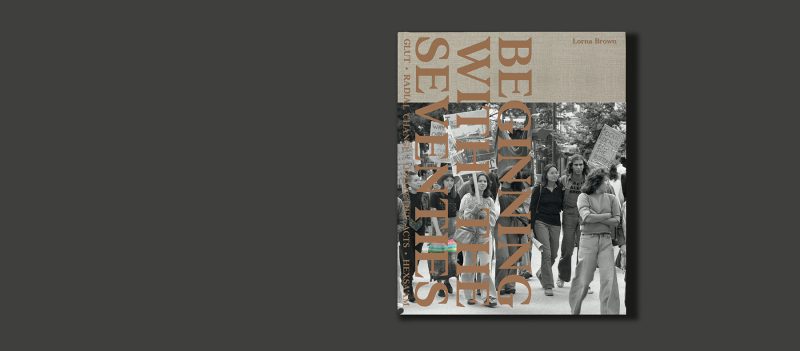 Exhibition catalogue from the four exhibitions associated with the Beginning with the Seventies project at the Belkin: GLUT (12 January-8 April 2018), Radial Change (22 June-12 August 2018), Collective Acts (4 September-2 December 2018) and Hexsa'am: To Be Here Always (11 January-7 April 2019), edited by Lorna Brown, Greg Gibson and Jana Tyner. [more information and purchase]
Exhibition catalogue from the four exhibitions associated with the Beginning with the Seventies project at the Belkin: GLUT (12 January-8 April 2018), Radial Change (22 June-12 August 2018), Collective Acts (4 September-2 December 2018) and Hexsa'am: To Be Here Always (11 January-7 April 2019), edited by Lorna Brown, Greg Gibson and Jana Tyner. [more information and purchase] -
Publication
2018
Lisa Robertson: Proverbs of a She-Dandy
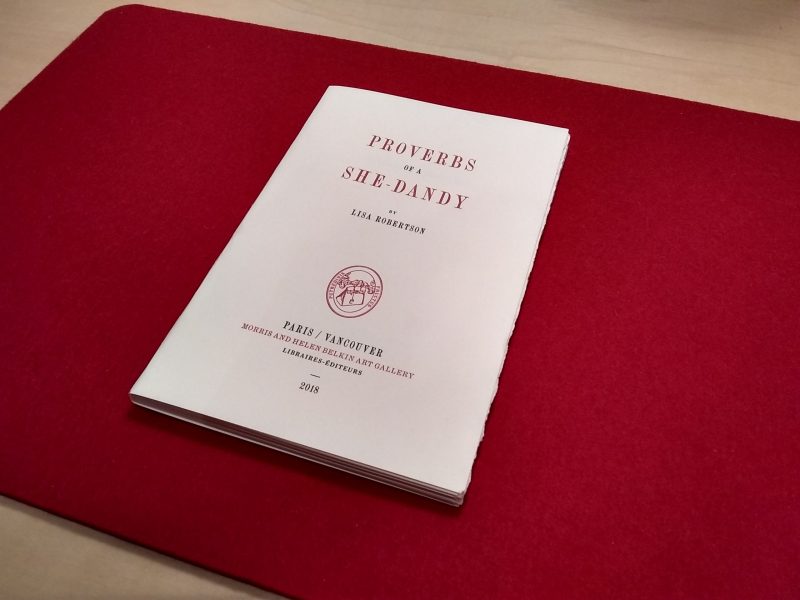 Written by Lisa Robertson, edited by Lorna Brown and Jana Tyner, designed by Derek Barnett, Information Office and printed by Peter Kruty Editions, Brooklyn, NY, Proverbs of a She-Dandy was commissioned on the occasion of the exhibition Beginning with the Seventies: GLUT at the Belkin (12 January-8 April 2018). [more information and purchase]
Written by Lisa Robertson, edited by Lorna Brown and Jana Tyner, designed by Derek Barnett, Information Office and printed by Peter Kruty Editions, Brooklyn, NY, Proverbs of a She-Dandy was commissioned on the occasion of the exhibition Beginning with the Seventies: GLUT at the Belkin (12 January-8 April 2018). [more information and purchase] -
Exhibition
4 September 2018 – 2 December 2018
Beginning with the Seventies: Collective Acts
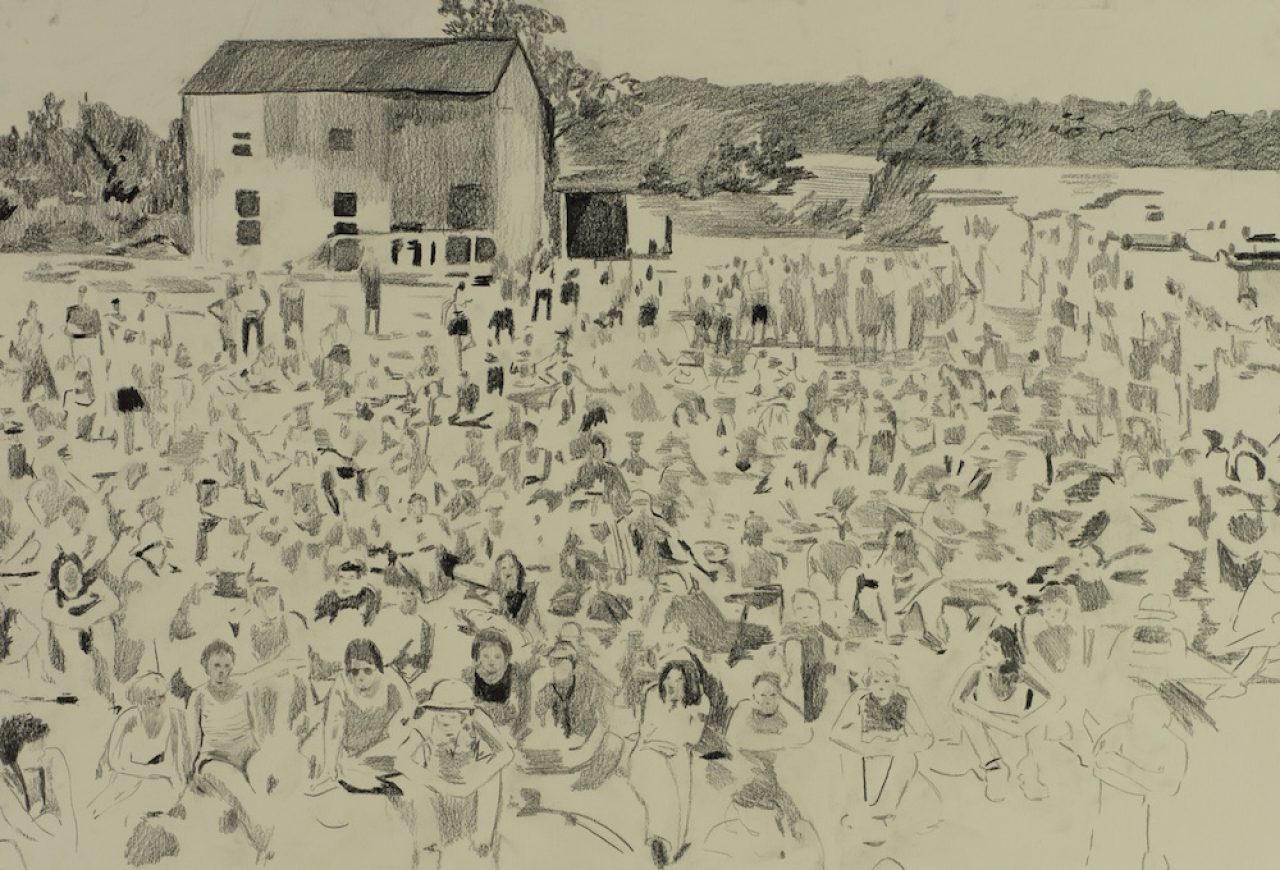
Collective Acts taps into the generative potential of archival research by artists into experiments with collective organizing and cooperative production, presenting new work by Dana Claxton, Jeneen Frei Njootli and the ReMatriate Collective, Christine D’Onofrio and Heather Kai Smith, alongside work by Salish Weavers Guild members Mary Peters, Adeline Lorenzetto and Annabel Stewart. Beginning with the Seventies: Collective Acts is curated by Lorna Brown and is the third of four exhibitions based upon the Belkin Art Gallery’s research project investigating the 1970s, an era when social movements of all kinds – feminism, environmentalism, LGBTQ rights, Indigenous rights, access to health services and housing – began to coalesce into models of self-organization that overlapped with the production of art and culture. Noting the resurgence of art practice involved with social activism and an increasing interest in the 1970s from younger producers, the Belkin has connected with diverse archives and activist networks to bring forward these histories, to commission new works of art and writing and to provide a space for discussion and debate.
[more] -
Exhibition
12 January 2018 – 8 April 2018
Beginning with the Seventies: GLUT

Celebrating the excessive abundance of the archive, Beginning with the Seventies: GLUT is concerned with language, depictions of the woman reader as an artistic genre and the potential of reading as performed resistance.
[more] -
Exhibition
22 June 2018 – 12 August 2018
Beginning with the Seventies: Radial Change
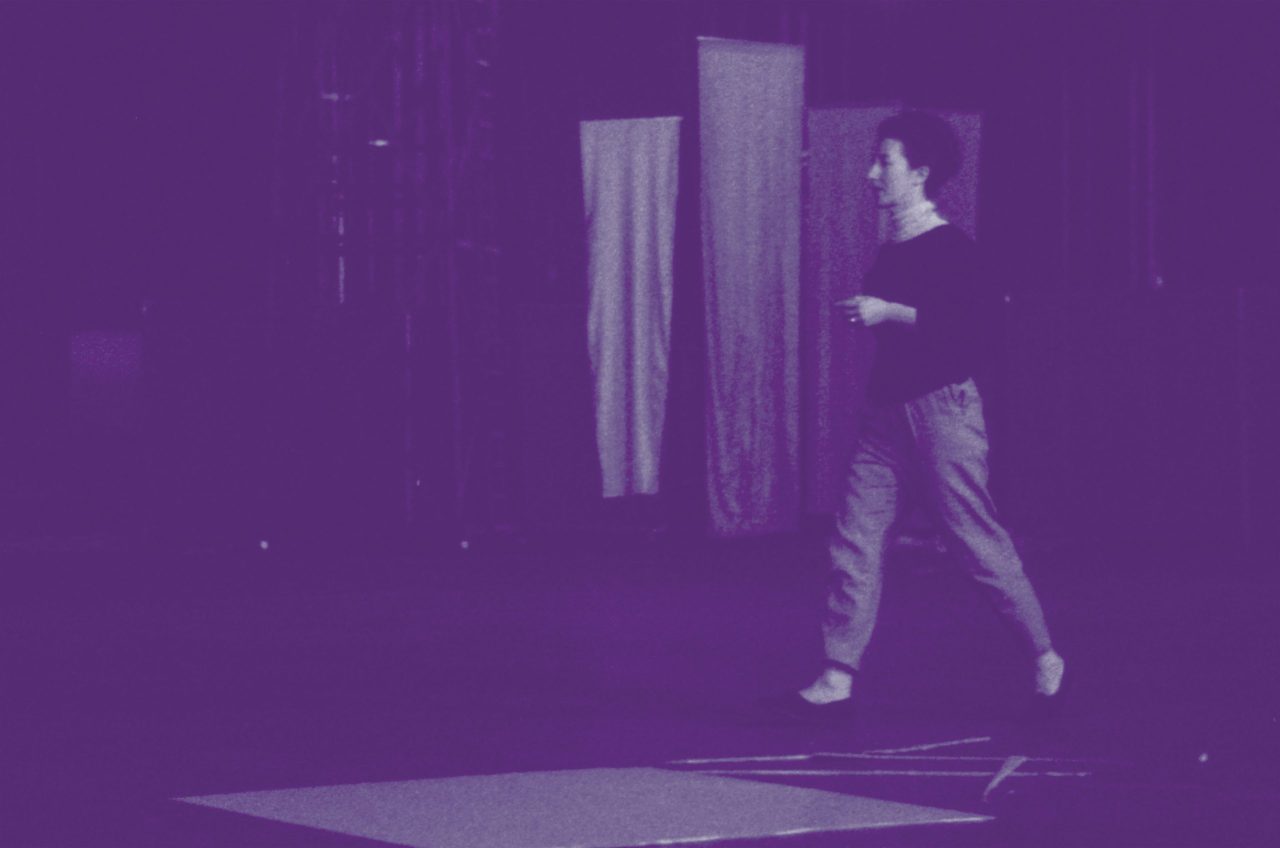
How is an archive formed? Memories of performance often exceed the containment of the document, whether photography, film, prop or testimony. As communities disperse and regroup over time, figures may slip away from the centre. Circling around the embodied archive, the exhibition Radial Change is drawn from the title of a dance work by Helen Goodwin. The elusive histories of Goodwin’s choreography and her influence on the interdisciplinary art scene of the 1970s are explored in new installation works by Evann Siebens and by Michael de Courcy.
[more] -
Exhibition
11 January 2019 – 7 April 2019
Hexsa’a̱m: To Be Here Always
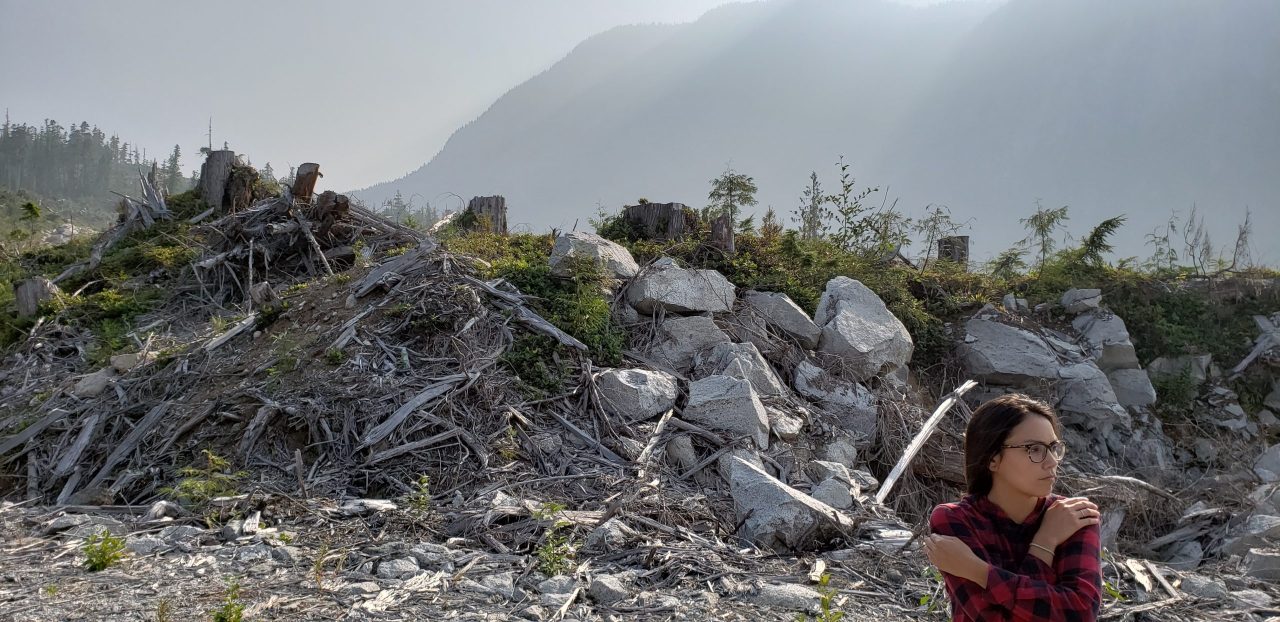
Working together at Kingcome Inlet in Summer 2018, a group of artists used film, video, social media, weaving, animation, drawing, language and song to address the urgent threats to the land and water. A manifestation of the relationships formed between the participants over this past year, Hexsa’a̱m: To Be Here Always is based on sharing knowledge and respectful collaboration. Simultaneously research, material, media, testimony and ceremony, the exhibit challenges the western concept that the power of art and culture are limited to the symbolic or metaphoric, and that the practices of First Peoples are simply part of a past heritage. As Marianne Nicolson states, “We must not seek to erase the influence of globalizing Western culture, but master its forces selectively, as part of a wider Canadian and global community, for the health of the land and the cultures it supports. The embodied practice of ceremonial knowledge relates to artistic experience – not in the aesthetic sense, but in the performative: through gestures that consolidate and enhance knowledge for positive change.” Hexsa’a̱m: To Be Here Always positions the gallery as an active location for this performance, drawing together many faculties and disciplines of the university in generative exchange.
[more] -
Event
3 Apr 2019; 2 pm
Concert at the Belkin: Hexsa’a̱m
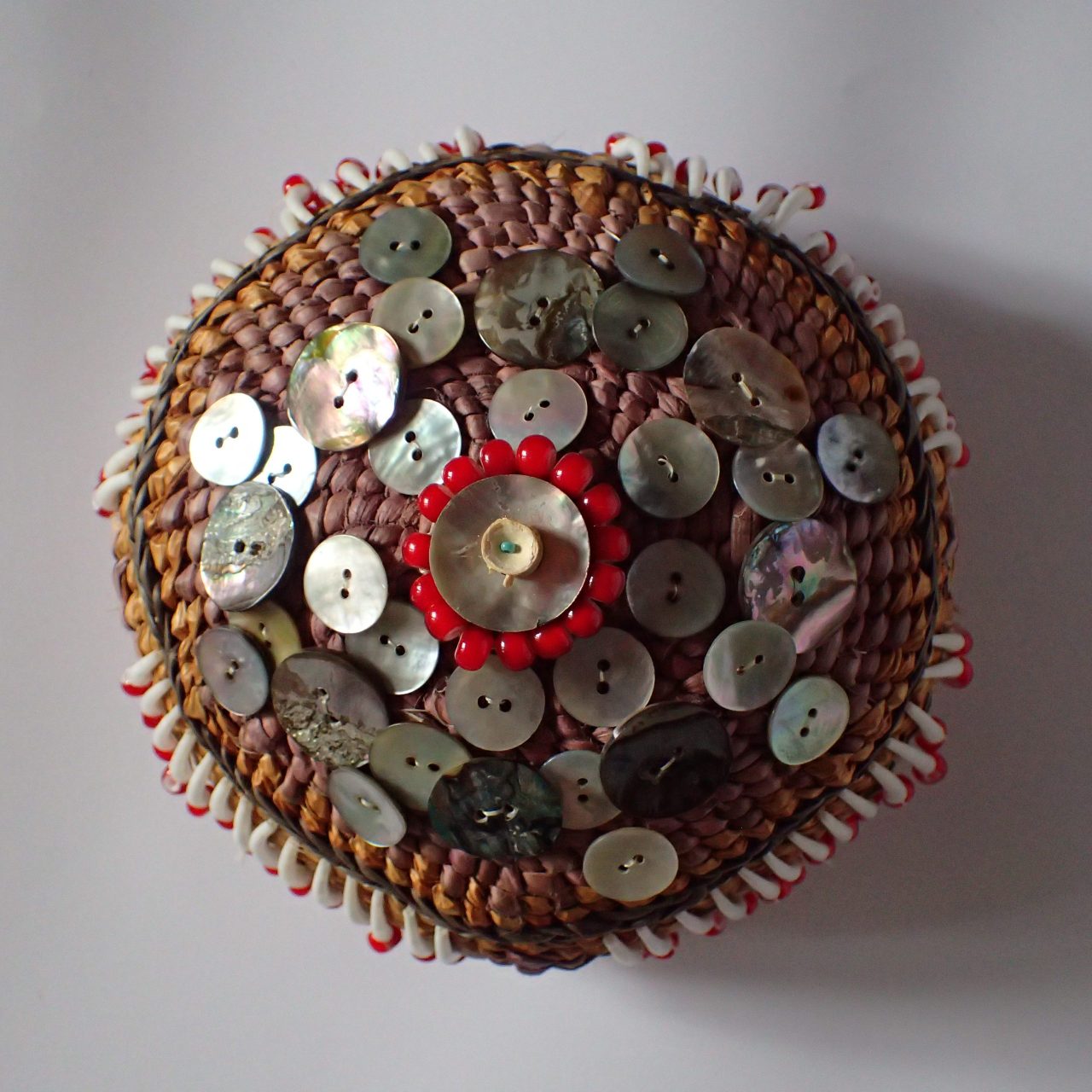
Once again, we are pleased to welcome the UBC Contemporary Players to the Belkin Art Gallery for a concert inspired by the exhibition Hexsa’a̱m: To Be Here Always. Led by Director Paolo Bortolussi, this graduate and undergraduate student ensemble from the UBC School of Music will animate the Gallery for an afternoon program celebrating themes from the exhibition. The program will feature an original composition by Leslie Opatril who worked closely with artists Marianne Nicolson and Althea Thauberger. Opatril is a Master's student at the UBC School of Music working under the supervision of Dorothy Chang.
Admission is free. [more] -
Event
Reading: The Baudelaire Fractal with Lisa Robertson
Join us in the Gallery for a reading by poet and essayist Lisa Robertson, “The Baudelaire Fractal.” Robertson describes the subject thusly:
[more] -
Event
3 Apr 2018, 4:00 pm - 6:00 pm
GLUT: Writers in the Rereading Room
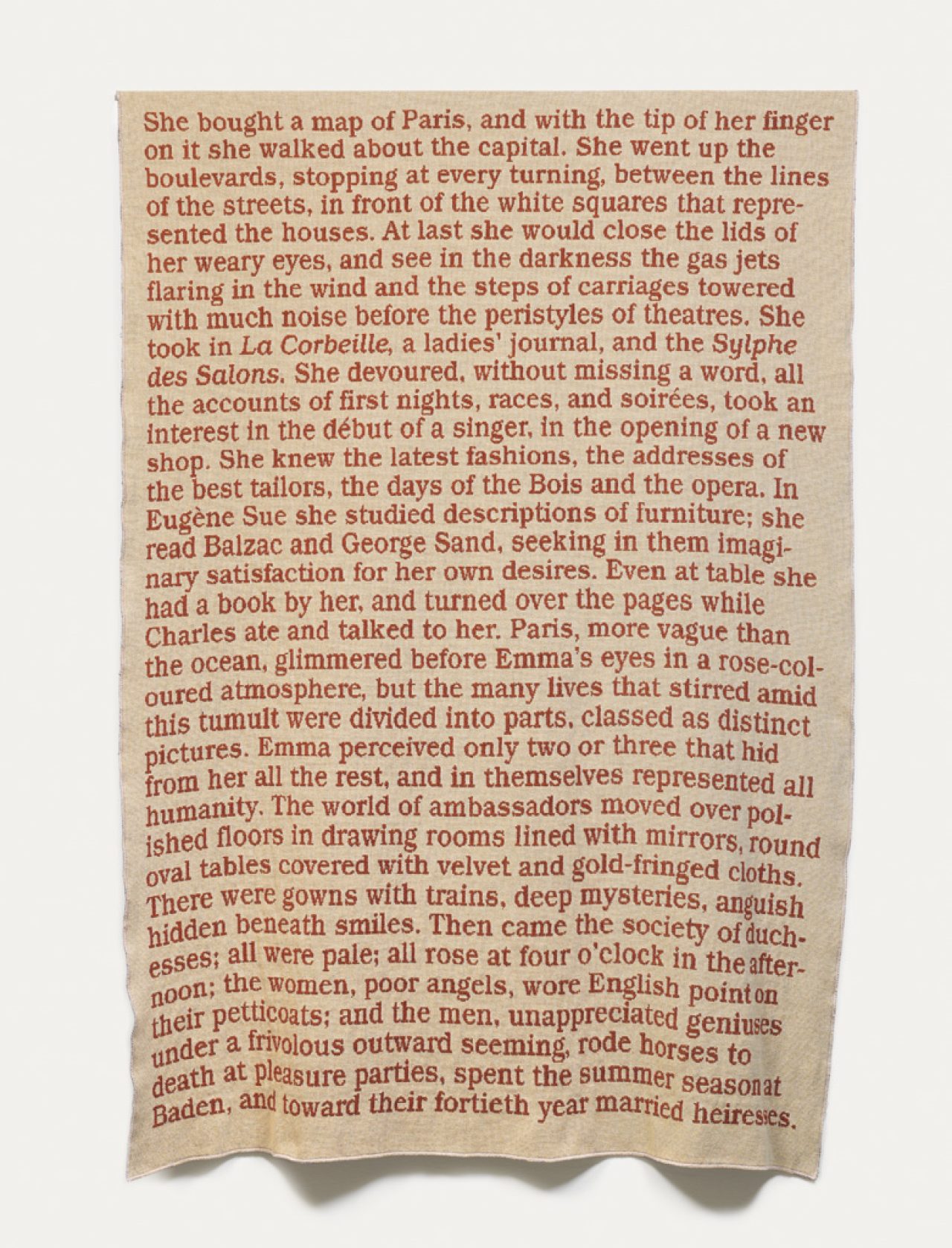 [more]
[more] -
Event
24 Jan 2018, 2:00 pm
14 Feb 2018, 2:00 pm
14 Mar 2018, 2:00 pm
6 Apr 2018, 2:00 pm
GLUT: The Readers Respond
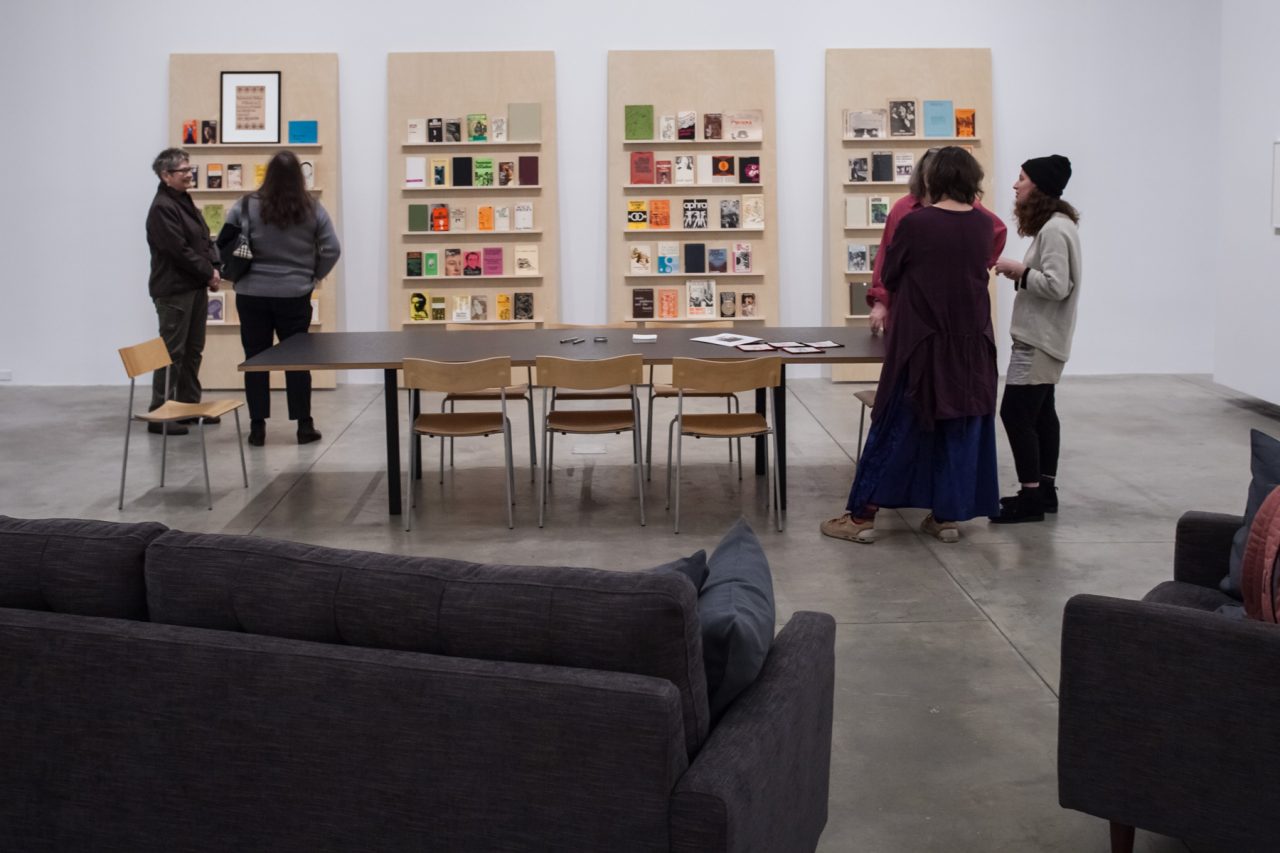 [more]
[more] -
Event
2 February 2018, 3-6 pm
Symposium: Groundhog Day Redux
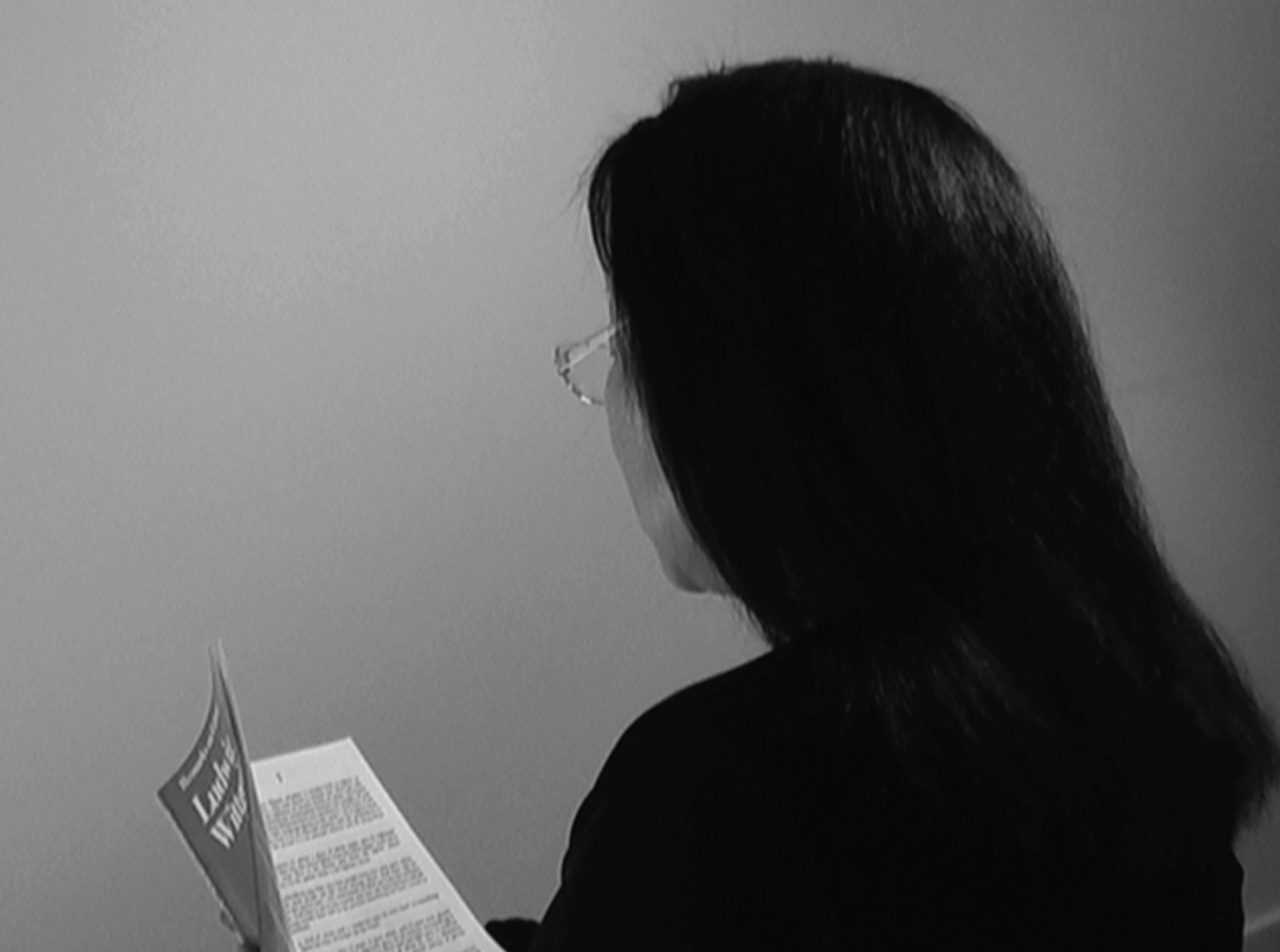
As part of the exhibition Beginning with the Seventies: GLUT, the Belkin is pleased to present Groundhog Day Redux, an afternoon symposium addressing the perennial nature of key issues in feminism and both the frustrations and fresh insights that come with repetition. Dian Million and Kristina Lee Podesva, in conversation with Kimberly Phillips, will address the topic of Archive as Body to consider how affect, emotion and embodiment influence out relationship to archives.
[more] -
Event
Concert at the Belkin: GLUT
Once again, we are pleased to welcome the UBC Contemporary Players to the Belkin Art Gallery for a concert inspired by the exhibition Beginning with the Seventies: GLUT. Directed by UBC School of Music faculty Drs. Corey Hamm and Paolo Bortolussi, the UBC Contemporary Players ensemble includes graduate and undergraduate students focusing on music and performance of our time. Programs blend masterworks by internationally acclaimed composers with exciting world premieres of works written expressly for the ensemble by UBC composition majors.
[more] -
Event
28 Nov 2018 at 2 pm
Concert at the Belkin: Collective Acts
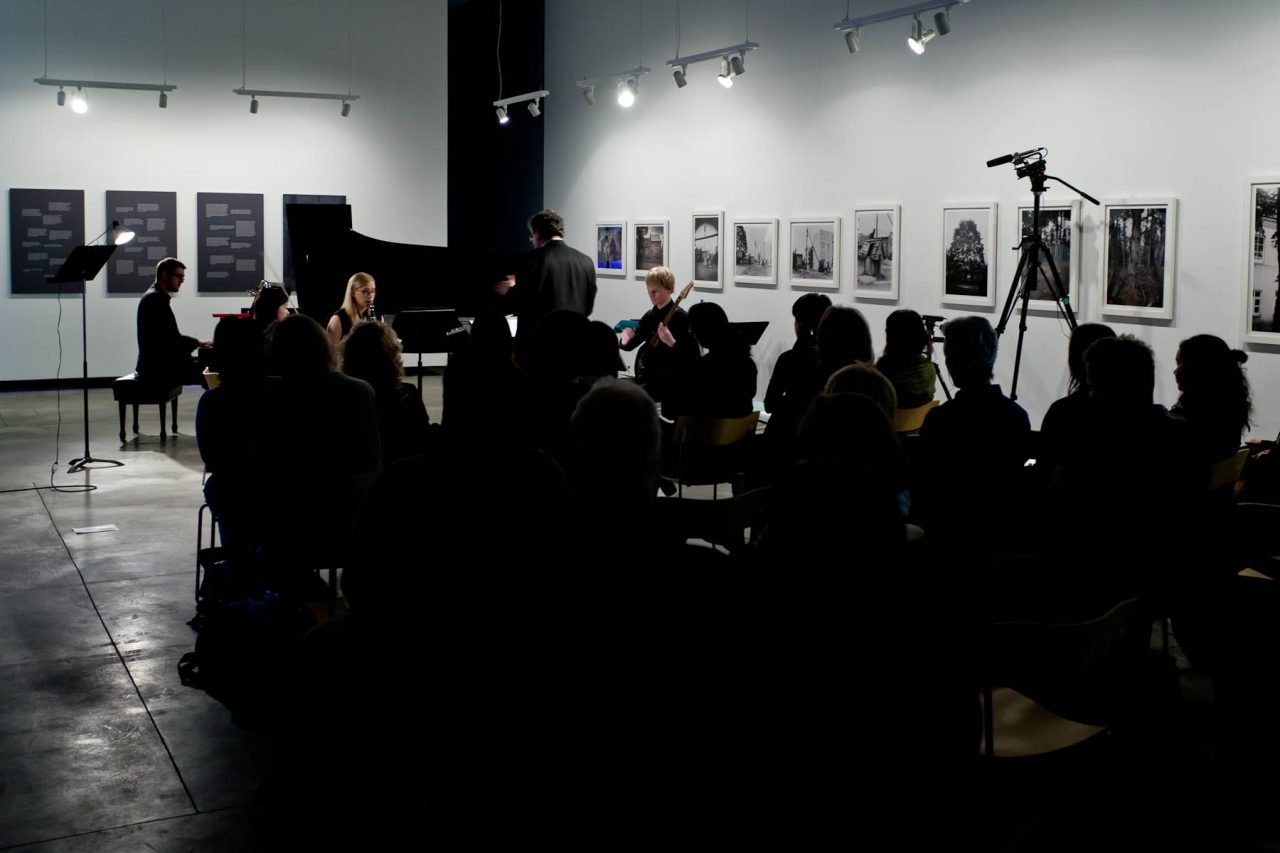
Join us for a concert by the UBC Contemporary Players at the Belkin Art Gallery. Ensemble Director Paolo Bortolussi presents a program that celebrates the Belkin Art Gallery’s current exhibition Beginning With the 70s: Collective Acts.
[more] -
Event
21 Jun 2018, 5:00 pm
The Making of an Archive Book Launch and Artist Talk with Jacqueline Hoàng Nguyễn
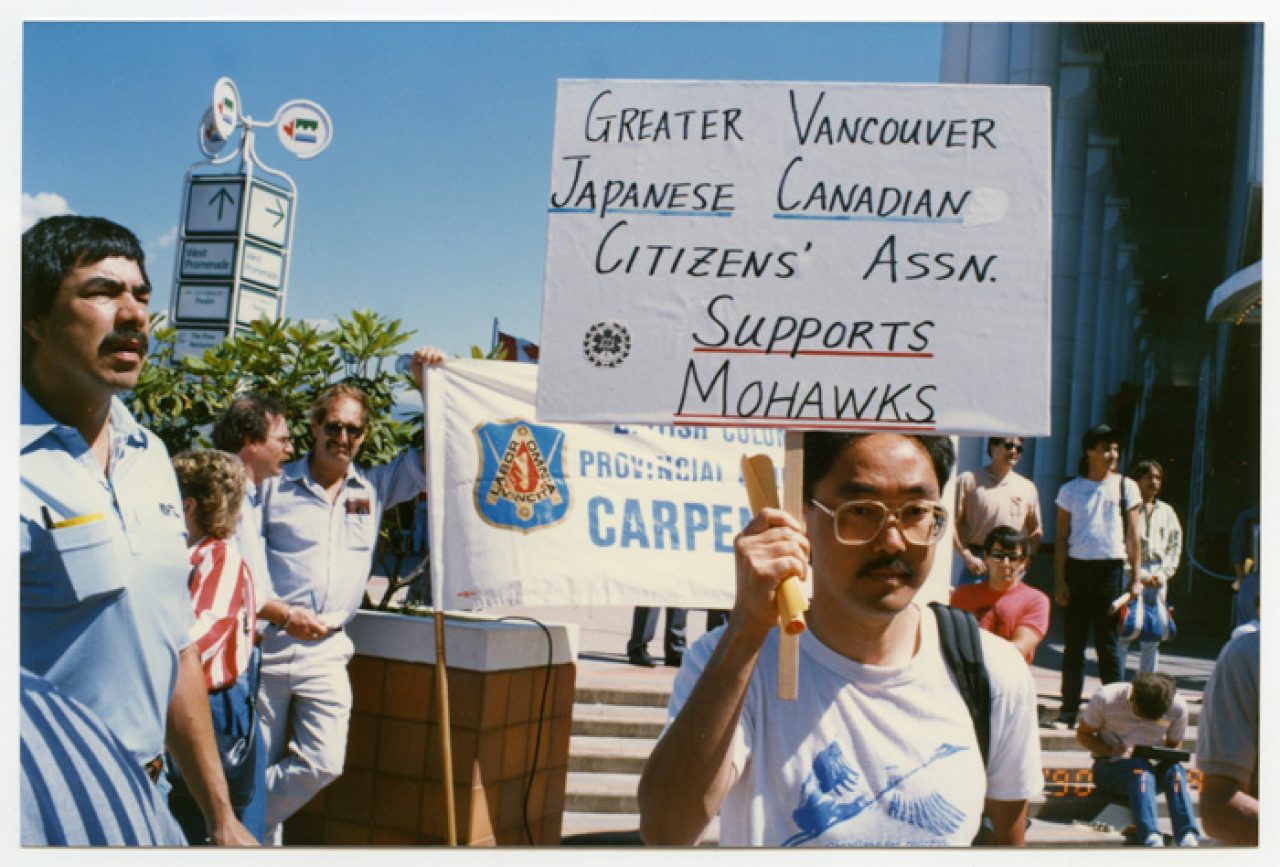
In collaboration with grunt gallery and in conjunction with the opening reception for Beginning with the Seventies: Radial Change, the Belkin is pleased to present a book launch and artist talk with Jacqueline Hoàng Nguyễn. The main catalyst for the initiation of Jacqueline Hoàng Nguyễn’s project The Making of an Archive was the photo albums of the artist’s father, an amateur photographer who took countless photographs of his daily life when he first immigrated to Canada in the 1970s. However, while doing research for previous works, the lack of representation of the immigrant’s daily life in state narratives seemed paradoxical for a country that is internationally known as the instigator of multiculturalism. Due to this visual deficiency and threat of photographic disintegration, Nguyễn initiated The Making of an Archive, a project that seeks to collect images of everyday life photographed by migrants, particularly of people of colour, in a direct, collective and exploratory approach. One of the salient themes of the work is how to make visible the rich histories of activism and solidarity that complicate the pervasive myth of the agreeable “model minority.” The publication The Making of an Archive serves as a critical document of Nguyễn’s research and the project’s relevance to larger conversations around Canadian vernacular photography by people of colour, the role of the artist-initiated archive, and how an expansion of the archival record relates to political and social change. As part of the book launch, the artist will ask, what is the process of building a collective archive and how do we come to understand our own pictures, together?
[more] -
Event
2 Nov 2018 from 3-6 pm
Symposium: Collective Acts
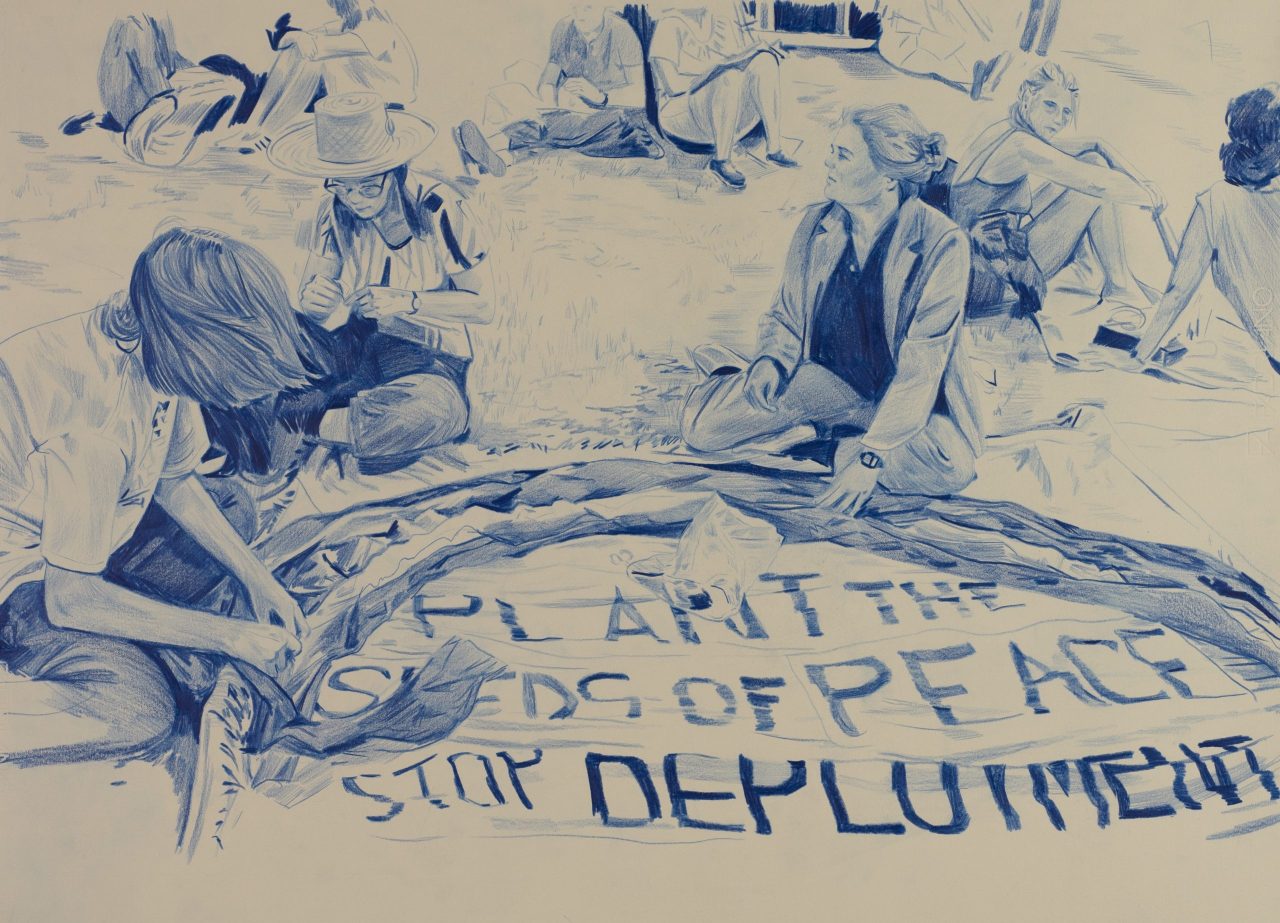
As part of the exhibition Beginning with the Seventies: Collective Acts, the Belkin is honoured to present an afternoon symposium addressing key issues in feminism related to collective organizing, mobilization and individual resistance. How does attention to the archive affect everyday experience and acts of resistance to hegemonic inequality? Attending to struggles with racism, sexism, heterosexism, and other intersecting oppressions, this program will address the exhibition and the stubborn frustrations that persist in perpetuity. Please join us in conversation with Candice Hopkins and Marilyn Dumont.
[more] -
Event
28 Feb 2019 from 3-6 pm, Panel + Reception
Symposium: Practices of Resistance
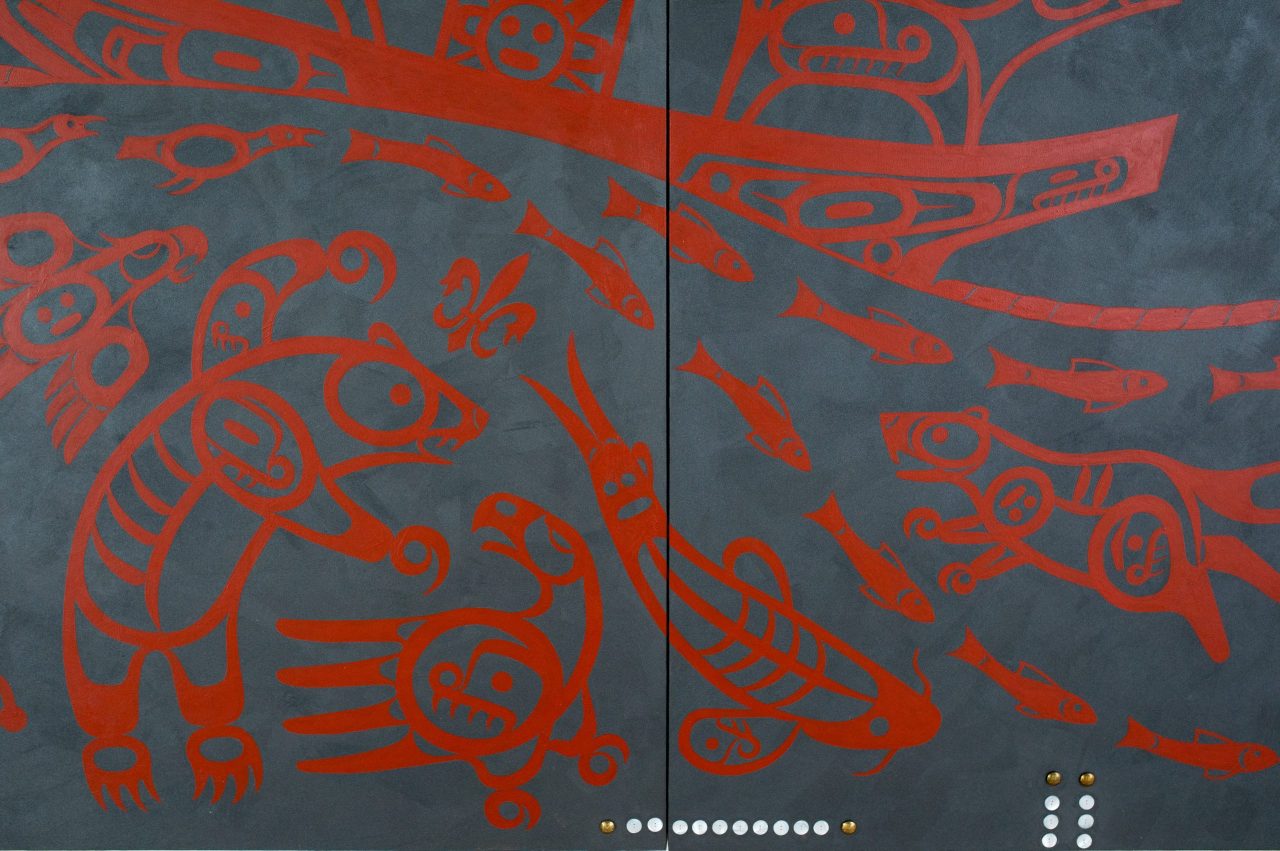
Hexsa'a̱m: To Be Here Always brings together new works by Indigenous artists who make work addressing the threats posed by Canadian colonial capitalism to their land, water and ecologies. Symposium speakers Teresa Montoya, Marianne Nicolson and Tania Willard will address issues raised by the continuing struggles for Indigenous sovereignty and strategies for art practiced as part of their communities' resistance against settler colonialism and ecological destruction. All three will be speaking from their experience as artists, activists and researchers whose practices are inextricably linked to the political and cultural life of their communities.
[more] -
News
09 Mar 2020
Wrapping up Beginning with the Seventies and Taking it to the Melbourne Art Book Fair
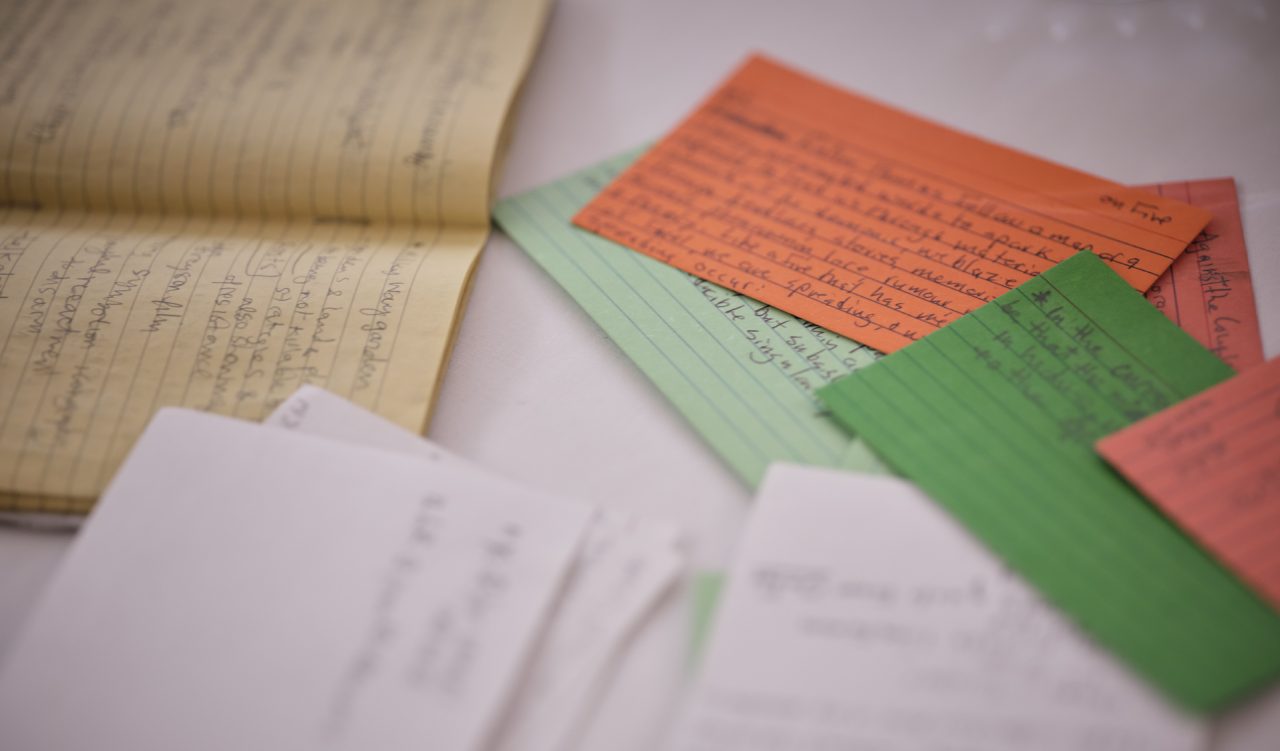
Thank you to everyone who joined us for the book launch, readings and talks to celebrate the publication of the Beginning with the Seventies project – the Friday and Saturday sessions were filled with good spirit and thoughtful interactions. It was an occasion for all those involved in the project from its earliest inception in 2016 to its final exhibition in 2019 to come together in a broad discussion of art, archives and activism. We are especially grateful to the speakers: Lisa Darms, Kate Hennessy, Sarah Hunt, Yaniya Lee, Jaqueline Mabey, Cait McKinney, Allyson Mitchell, Lisa Robertson, Denise Ryner, Erin Silver, Thea Quiray Tagle and the Belkin’s Lorna Brown. Copies of Beginning with the Seventies, co-published by the Belkin and Information Office, are available for sale for $70 CAD through the Belkin and Information Office.
[more]